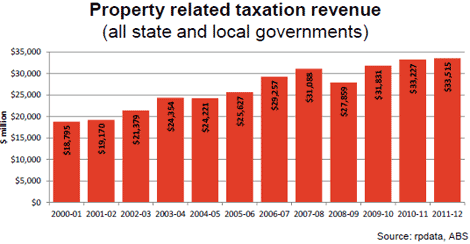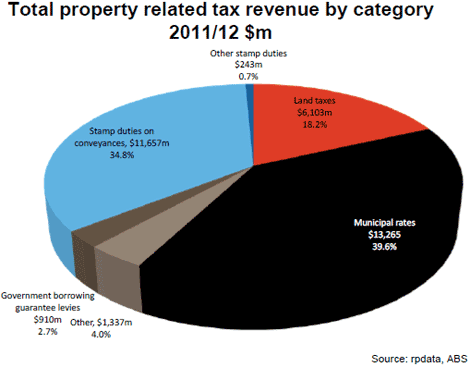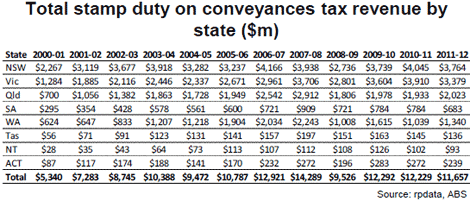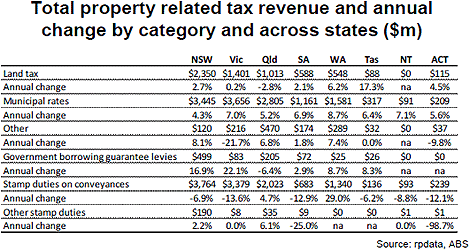Property taxes remain a strong earner for governments: Cameron Kusher

Property taxes remain a staple income earner for the federal and state and local government coffers where, despite a weak property market across Australia during the 2011-2012 financial year period, tax revenue collected by government continued to rise.
Analysis by RP Data on the amount of tax income derived from property to bolster state and local government revenue during the 2011/12 financial year revealed that a whopping $33.515 billion was earned from this source.

Over the year, this equated to 46% of all taxation revenue for state and local governments and while down from 47.2% over the 2010/11 financial year, the total amount of property-related taxes rose by 0.9% over the financial year.
Although we saw an increase in tax revenue, it is the smallest annual change in revenue since revenue fell -10.4% over the 2008/09 financial year.

Our data shows that the total value of dwelling sales across the country fell by -6.1% over the financial year and despite this, property taxes increased.
To add to this, the combined capital city home values fell by -3.6% over the year and the annual number of home sales across the country was -6.1% lower.
Given these figures, it is clear there was only one way state and local governments could increase their tax revenue, and that was by raising tax rates on property.
Looking at where property taxes are earned by category over the 2011/12 financial year, the results show that the two largest sources of revenue are municipal rates (39.6%) and stamp duties on conveyances (34.8%).

These two categories accounted for almost 75% of all property-related taxes collected. If land tax revenue is then added, these three categories account for 92.6% of all property-related tax revenue.
Over the 2011/12 financial year, municipal rates revenue rose by 6.1% and land tax revenue rose by 1.6%, while stamp duty revenue fell by -4.7%.
While there have been many calls to dump stamp duty and change it to a broad-based land tax, it appears that neither side of politics is seriously considering the change which would most likely be fairly unpopular with voters.
With home values and transactions falling during the 2011-2012 financial year, it is clear that revenue from stamp duty has received the full brunt of the slowdown.
It is interesting to note that stamp duty revenue over the 2011/12 financial year was -18.4% lower than the peak recorded in 2007/08 - clearly highlighting the impact of reduced sales volumes on this important government revenue stream.

Interestingly, excluding Queensland and Western Australia, stamp duty revenue actually fell across each state over the 2011/12 financial year.
In Queensland, the stamp duty collection rose by 4.7% and in Western Australia it increased by 29%.
(Note: over the year, the number of house and unit sales increased by 4.0% in Queensland and by 10.9% in Western Australia.)
Municipal rates, which rose by 6.1% across every state and territory during the 2011-2012 financial year, are the largest source of taxation revenue for states and local governments.
The revenue derived from rates is increased through either lifting the amount of rates collected or by the developmentof new properties therefore increasing the ratepayer base.
Land tax is recorded as the third largest source of revenue and it increased by 1.6% at a national level over the year.
Land tax rose over the year in each state except for Queensland where it fell by -2.8%.
Property tax is clearly the most important source of revenue for state and local governments across the country and it is therefore important for governments to find ways to grow revenue over time or alternatively, look for other ways to create it.
Since the end of the last financial year, we have seen an increase in sales activity across the national housing market.
As a result, stamp duty revenue is likely to increase over the next financial year however, any increase is unlikely to be significant.
Overall we would expect that at a national level property-related tax revenue will increase over the 2012/13 financial year however, the rate of growth is once again likely to be quite low.
Cameron Kusher is senior research analyst at RP Data.